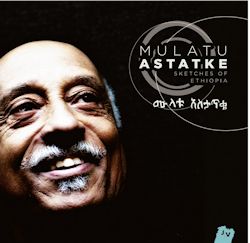1. Azmari
2. Gamo
3. Hager Fiker
4. Gambella
5. Assosa Derache
6. Gumuz
7. Motherland Abay
8. Surma
Mulatu Astatke (vibraphone, piano, keyboards)
Step Ahead Band:
James Arben (flute, oboe, tenor saxophone, clarinet)
Richard Olatunde Baker (percussion)
John Edwards (double bass, bass)
Alexander Hawkins (piano, keyboards)
Danny Keane (keyboards, cello)
Tom Skinner (drums)
Byron Wallen (trumpet)
Guests:
Yohanes Afwork (washint)
Messale Asmamow (krarr)
Indris Hassun (masinko)
Fatoumata Diawara (lead vocals on Surma)
Tesfaye (lead vocals on Gamo, Gambella and Gumuz)
I’ve always found ‘jazz fusion’ a difficult genre to really relate to because as Mulatu Astatke says “it's not easy to blend two cultures and you have to
make sure that one doesn't dominate another one.” This is the tricky thing which I find the problem with almost all such music I’ve heard and usually I
find that is precisely what does happen. When I’ve listened to Latin Jazz or Cuban Jazz for example I find that after a short time I get bored because it
seems that I’m listening to Latin or Cuban music with only hints of jazz that are insufficient to help create a ‘new’ sound and there other examples of
this problem with African Jazz fusion too. This disc, however, is a revelation since it shows that Mulatu Astatke has resolved this apparent dilemma having
found a way of truly fusing the two cultures together. The resulting blend is the most convincing example of the genre I have ever heard with neither the
Ethiopian melodies or the Jazz element dominating proceedings instead of which a completely new and fully integrated sound emerges which is a true fusion
of each. Mulatu Astatke, widely acknowledged as the ‘father of Ethio-Jazz’, was sent by his parents to Wales in the late 1950s to study aeronautical
engineering but ended up instead with a degree in music finishing up as the first African student to enrol at Boston’s Berklee College of Music. There he
studied vibraphone and percussion and it’s as a vibraphonist and pianist that he is known and respected. He recorded a great deal in his native country
during the 1970s but following the takeover there by the Derg military junta the record label owners that he had recorded for were forced to flee the
country and those records ceased to able available and so his music was all but forgotten outside Ethiopia. It was only in the 1990s that people began to
rediscover it and when in 2005 seven of his songs were featured in Jim Jarmusch’s film Broken Flowers his name suddenly became widely known. This
disc is the first of his to be released on an international label so it is to be hoped that at the age of 70 he will finally achieve the world wide
recognition that this disc proves he so richly deserves.
As soon as the first strains hit you from the CD player you know this is something altogether different and you can’t help but sit up and take notice such
is the music’s infectious beat. Together with his seven-piece London based band Step Ahead he has created a really exciting cross cultural fusion of native
Ethiopian rhythms and jazz with a good dose of funk thrown into the mix and the result is truly original. Coming to ethio-jazz for the first time as I have
the impact is quite seismic. In addition to the band his guests include three playing Ethiopian instruments the washint, an end played flute, a krarr, a
six or seven stringed bowl shaped lyre and the masinko which is a single stringed bowed lute. What was even more thrilling for me was that at one time I
collected ethnic instruments and people would bring me them as presents from different countries they’d visited. I also happened to visit Ethiopia on a
work related trip in 1979 and brought some back myself but have never known what they were called (I didn’t have the power of the internet then) but
through this disc I’ve discovered that I have all three of the above so now I know what they are and how they sound!
On three of the tracks he has the addition of Ethiopian singer Tesfaye and on Surma the silky smooth vocals of Malian star Fatoumata Diawara. An
extended version of Surma is available on the vinyl disc but it only includes six tracks. It is a shame that the CD version did not include the
longer original as well since at less than 53 minutes it would easily have fitted on.
This is music that is totally enthralling and involving and if anything would make you want to get up and dance this is surely it, however it is hard to
describe and must be heard. Motherland Abay is the slowest of the tracks and its cello opening is achingly poignant and makes its mark in a
particularly effective way in what I presume is a reflection of homesickness.
As soon as the record ends I’ve found myself playing it again and every time I hear new aspects to engage me and I urge you to hear it too and allow
yourself to be enchanted and if his music is as new to you as it was for me you are in for a jaw-dropping treat!
Steve Arloff
